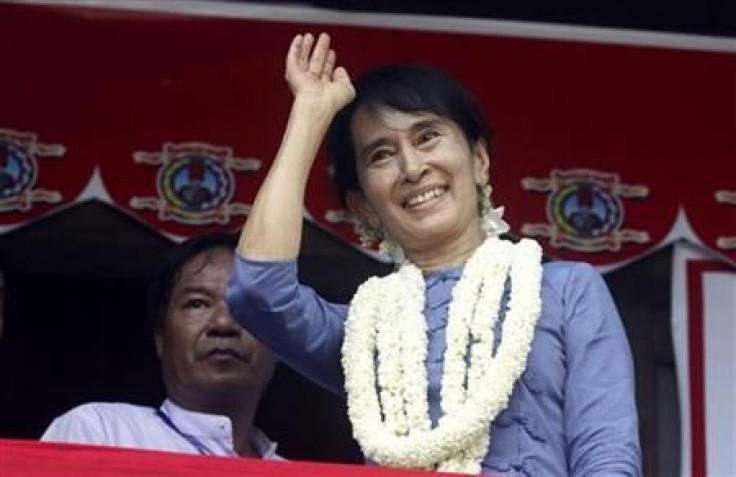Aung San Suu Kyi Will Run for Myanmar Parliament

Myanmar democracy leader Aung San Suu Kyi will run in a parliamentary by-election expected by the end of the year, a top party official said Monday, giving legitimacy to moves toward democracy after decades of military rule.
It will be the first time the Nobel Peace Prize laureate contests a seat herself, having not stood as a candidate in her National League for Democracy's 1990 election landslide, which was ignored by the then military regime and led to her lengthy incarceration.
Aung San Suu Kyi intends to stand for the by-election but it's a bit early to say from which constituency she will run, Nyan Win, a member of the NLD's executive committee, told Reuters.
There are 48 seats available in Myanmar's new senate and lower house.
The NLD was officially dissolved by the military junta for refusing to take part in last year's parliamentary polls because of unfair and unjust laws that would have prevented hundreds of its members from becoming lawmakers.
But the party voted unanimously on Friday to re-enter the political fray following an amendment to the constitution allowing those who have served sentences for crimes to take part in elections. Many NLD members, including Suu Kyi, are current or former political prisoners.
Suu Kyi is the daughter of late independence hero Aung San and was a staunch opponent of the military during its 49 years of totalitarian rule. However, she has shown willingness to meet with the new civilian government, even though it is run by former junta generals.
Aung Naing Oo, a Myanmar expert with the Thailand-based Vahu development institute, said her decision to take part in the much-criticized political system would mark the beginning of an irreversible democratic transition.
Aung San Suu Kyi has realized that she needs to work with the government to move the country forward and she'll be in a position to say and do a lot more. She'll bring a lot of things to the game, he said.
She can make a big difference. Even if we have only a little bit of democracy, something here is happening that no one has seen before. For the country to change, this needed to happen.
Since the annulled 1990 election, Suu Kyi, 66, has spent most of the time in detention. She was released a year ago and still chooses to live in the lakeside house that was her prison on and off for 15 years.
U.S. ENDORSEMENT
She had earlier given no indication she was interested in becoming a lawmaker but has always referred to herself as a politician.
Her decision comes after Myanmar won a powerful endorsement on Friday, with U.S. President Barack Obama announcing Secretary of State Hillary Clinton would visit the resource-rich country neighboring China next month, citing flickers of progress.
For sanctions to be eased, Clinton has said the release of more political prisoners and a peace deal with ethnic minorities would be necessary. Suu Kyi and the NLD would be expected to pursue these issues aggressively in parliament.
The legislature convened in February and is Myanmar's first since the late 1980s, when a unicameral People's Assembly controlled by the military's Burma Socialist Program Party was scrapped.
Myanmar has so far released about 280 political prisoners this year and another amnesty is expected in the coming months.
The NLD, Myanmar's biggest opposition force, would have dominated parliament had the 1990 result been accepted by the junta. The regime annulled the 1990 result only last year, arguing that the NLD's win could not be recognized because it was in breach of a constitution drafted 18 years later.
Suu Kyi commands considerable influence over the party and Ko Ko Hlaing, a senior adviser to President Thein Sein, said on the sidelines of a regional summit in Bali last week that the NLD's decision to re-register was a significant step.
The presence of Suu Kyi in a parliament that was criticized initially as a rubber stamp with limited scope for debate would be another dramatic sign of the openness that could give more legitimacy to the retired generals in control of the country, who are seeking acceptance, engagement, support and investment from the international community.
The NLD's Nyan Win said the party would change its structure and would prioritize younger members and those from Myanmar's multitude of ethnic groups when choosing candidates for the by-elections.
(Writing by Jason Szep and Martin Petty; Editing by Paul Tait)
© Copyright Thomson Reuters 2024. All rights reserved.











